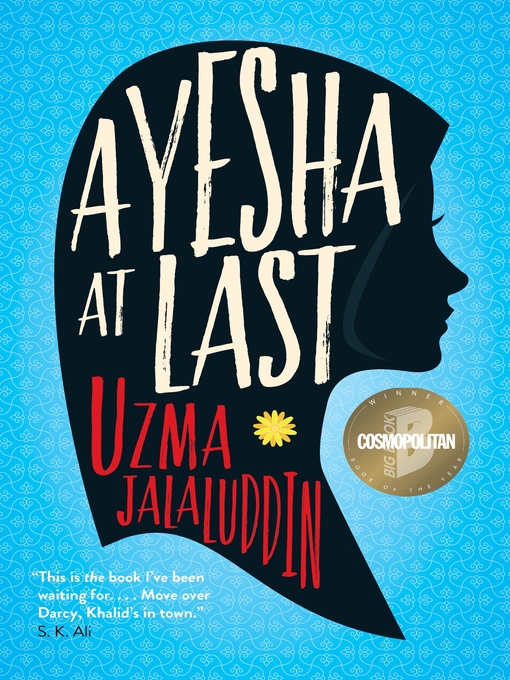Ayesha might be a little lonely, but the one thing she doesn't want is an arranged marriage. And then she meets Khalid... How could a man so conservative and judgmental (and, yes, smart and annoyingly handsome) have wormed his way into her thoughts so quickly?
As for Khalid, he's happy the way he is; his mother will find him a suitable bride. But why can't he get the captivating, outspoken Ayesha out of his mind? They're far too different to be a good match, surely...
Comment: The book chosen to be the buddy read with my friend H. for this month of September, I had high hopes for it especially because it would feature Muslim characters, a theme I admit I don't tend to read much of.
In this book, marketed as a Muslim version of Pride and Prejudice, we meet Ayesha Shamsi, a 27 year old woman who just started working as a substitute teacher but her initial experience isn't one of great success. Her family life is usually a good one but her younger cousin Hafsa is now accepting marriage proposals and this does affect Ayesha's emotions since the rest of the family keeps reminding her of the fact she isn't married yet. One day she meets Khalid and all about his ways screams conservative, so she believes they wouldn't be a good match, except the longer they get to know each other and more often they interact, the more she can't stop thinking of him and vice-versa. But would their families think they should be a couple or the arranged marriage method is what they should do instead?
I actually liked reading about this cast of characters. The writing is engrossing and the story different but realist enough to make me curious about what would happen next. It can be obvious where the comparison with Pride and Prejudice happens but I don't think this story needed this tactic, unless it was just a way to expose the book to a broader audience of readers who might not look at it twice otherwise.
The author has certainly read a lot but I think what probably makes her story feel more interesting is the fact she knows what she is writing about. The author is Muslim as well and her knowledge becomes obvious on the page, especially since there are many details on the Muslim religion used to propel the story, as well as how others see Muslims and how Muslims themselves think of their beliefs and such. I'm saying this because even when the story featured things not exclusive to Muslims, their faith and traditions are never put aside and this certainly makes the story feel more realistic.
As one can imagine, several subjects are mentioned and I thought the main one would clearly be on racism because in the beginning, when the focus was on Khalid, who dresses and acts as a conservative Muslim man, this was clearly something he would be subjected to by his boss. However, the story has a wider range of themes and as we get to follow more characters - not just Khalid and Ayesha as protagonists - more little things are shared and while some things are seen in any novel with Muslim characters, some different ones were highlighted here too.
Khalid is described as fundamentalist, he tries his best to follow the strict rules of behavior of a traditional Muslim man. I think the fact he is described as having a beard and wearing traditional clothes paints quite a picture of how we should see him but I also found it interesting other Muslim men he knew sort of mocked him or teased him for it. One of the things I liked the most about the book was the slight peek into what could be the daily interactions or everyday things of people who are in a country where the majority does not have the same rituals or beliefs (action is set in Canada) and how smaller communities live alongside them. I also liked how Muslims are mostly portrayed as quite accepting of others, not imposing themselves... funny we tend to always think everyone believes their ideals are better, isn't it?
Ayesha is considered a modern woman, but she also keeps the traditions of her religion, she also uses the hijab. I think she had a great personality, a good blend of humility and independence and I could understand all her decisions, even those that, from the outside, one would say were silly, such as when she kept helping her younger cousin even though she wasn't nice to her. Of course, this means some situations could have been avoided but where would the fictional plot be then? Still, I was rooting for Ayesha and hoped she would be able to see what was in front of her.
In fact, this did happen way before the end of the book and that is when I finally realized how similar the author intended this to be with Jane Austen's book. Again, I think this wasn't necessary, the story had enough elements to work on its own... This means that, for those who know Pride and Prejudice, there is a proposal which is not accepted more or less half way, and something similar happens here, and there is still a lot of story after what one would think were string situations.

No comments:
Post a Comment